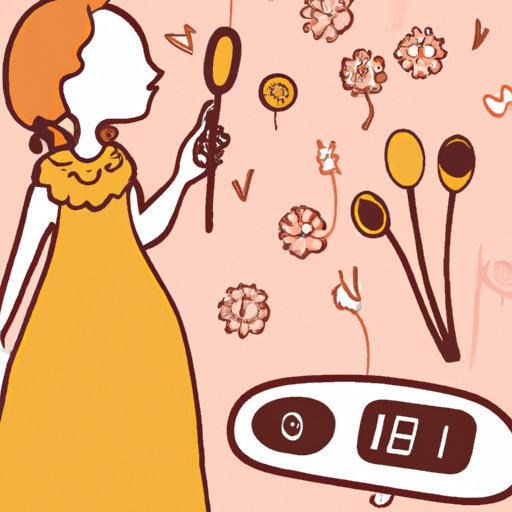
Introduction
Getting pregnant is one of the most exciting experiences a couple can have. However, it can be stressful when you’re not sure about the science behind getting pregnant. The question on many people’s minds is whether it’s possible to get pregnant on ovulation day. In this article, we’ll explore the science behind ovulation, conception, and fertility, so you have a better understanding of the process.

Exploring the Science Behind Ovulation and Getting Pregnant
Ovulation is the point in the menstrual cycle when a mature egg is released from the ovary. The primary role of ovulation is to increase the chances of conception. The egg travels through the fallopian tube and waits for sperm to fertilize it. The female reproductive system is complex and involves many different hormones and processes.
The menstrual cycle consists of several phases that affect fertility. During the follicular phase, the body prepares for ovulation by producing follicle-stimulating hormone (FSH), which initiates the development of an egg inside the ovary. The luteal phase follows ovulation, when the remaining follicle becomes the corpus luteum and secretes progesterone to prepare the uterus for pregnancy. Understanding how the menstrual cycle works can help you identify your fertile window, which is the time when you’re most likely to conceive.
What You Need to Know About Conception: A Comprehensive Guide
Sperm, which carries half of the genetic material needed to create a new life, plays a vital role in conception. When sperm is deposited in the vagina, it travels through the cervix and into the uterus, searching for an egg to fertilize. When the sperm penetrates the egg, fertilization occurs, and a zygote is formed. The zygote then travels to the uterus, where it implants and grows into a fetus.
Several factors can affect fertilization and pregnancy, including age, hormonal imbalances, smoking, and medical conditions. For example, women over 35 have a higher risk of developing complications during pregnancy. Men with low sperm count or motility may also have trouble conceiving.
Understanding Your Fertility: Can You Really Get Pregnant on Ovulation Day?
The probability of getting pregnant on ovulation day depends on several factors, including the lifespan of the egg and sperm. An egg typically survives for about 24 hours after ovulation, while sperm can live for up to five days inside the female reproductive tract. The highest chance of conceiving occurs when intercourse takes place within the 24-48 hour window leading up to ovulation. That being said, it is still possible to get pregnant on ovulation day if you have sex in the morning and ovulate later that day because sperm can live up to five days inside the female reproductive tract.
If you’re trying to conceive, you may want to use ovulation predictor tools and methods such as ovulation predictor kits, basal body temperature tracking, and cervical mucus monitoring to track your fertile window. These tools are useful in helping you identify when ovulation is likely to occur, and can, therefore, help you time intercourse.
Other factors that can affect fertility and conception include stress levels, weight, diet, and sexual health issues such as sexually transmitted infections (STIs).
Maximizing Your Chances of Getting Pregnant: Tips and Strategies
If you’re trying to conceive, there are some lifestyle changes you can make to improve fertility. Quitting smoking and moderating alcohol consumption can boost your chances of getting pregnant. It’s also important to maintain a healthy weight and get regular exercise. Eating a healthy diet that’s rich in fruits, vegetables, and whole grains can provide essential nutrients for a healthy pregnancy.
The best positions for sex when trying to conceive may also play a role in conception. Positions that allow deep penetration, such as the missionary position or doggy style, may increase the chances of sperm reaching the cervix.
Myths vs. Facts: Debunking Common Misconceptions About Ovulation and Pregnancy
There are many myths surrounding ovulation and pregnancy. One common misconception is that women can’t get pregnant during their period. While it’s less likely, sperm can survive inside the female reproductive tract for several days, and ovulation can occur earlier or later than expected in some women, increasing the risk of unintended pregnancy. Another myth is that women should orgasm during sex for conception to occur. While orgasms can encourage uterine contractions, which can move sperm towards the cervix and increase the likelihood of conception, they are not necessary for fertilization to occur.
It’s essential to separate fact from fiction when attempting to conceive, so you’re not wasting time and effort on a method that isn’t effective.
The Role of Timing in Conception: A Guide to Your Fertile Window
The fertile window refers to the period when a woman is most likely to conceive. This period varies among women, but it usually occurs between the 10th and 15th days of the menstrual cycle. You can track your fertile window by monitoring the changes in your cervical mucus and taking basal body temperature. Knowing your fertile window can help you optimize the timing of intercourse for conception.
When trying to conceive, timing is everything. Therefore, understanding your menstrual cycle and ovulation can be very helpful in successful conception.
The Emotional Journey of Trying to Conceive: Coping Strategies and Support Resources
Trying to conceive may be a stressful and emotional process for some couples. It’s normal to feel anxious or overwhelmed, especially if you’ve been trying for a while. Strategies for managing stress include getting enough sleep, practicing relaxation techniques such as yoga or meditation, and seeking emotional support from loved ones or a counselor. It can also be helpful to connect with support groups and online forums, where you can share your experiences with other people who are going through similar situations.
Conclusion
In conclusion, getting pregnant on ovulation day is possible, but it depends on many factors, including timing, the lifespan of the egg and sperm, and the fertility of both partners. Fortunately, understanding the scientific and practical aspects of ovulation and conception can help maximize your chances of pregnancy. Remember that it’s normal for the process of trying to conceive to be emotional and stressful, but with patience, support networks, and knowledge, the journey can be a positive one.





